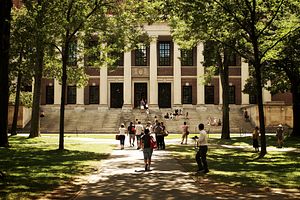The Financial Times reported yesterday that Washington had considered a total ban on student visas for Chinese nationals. Citing three people familiar with the situation, FT revealed that Stephen Miller, a senior adviser to U.S. President Donald Trump, had urged the Trump administration to make it impossible for Chinese citizens to study in the United States, so as to deal with “China’s nontraditional intelligence collectors.”
Although the idea was proposed early this year and had been “shelved over concerns about its economic and diplomatic impact,” according to FT, the information still caught the immediate attention of many Chinese international students in the United States. The news has been shared widely on Chinese social media and instant messaging tools.
Many Chinese students in the United States, along with a number of U.S. observers in China, believe that Washington would not adopt such a hawkish proposal, because it is not only detrimental to the U.S. educational market, but goes against U.S. laws and fundamental values.
To some degree, this argument is reasonable.
Students from China have dominated the U.S. international student market for years. Data from the U.S. government’s Student and Exchange Visitor Information System (SEVIS) shows that in the 2016-17 school year, a total of 350,755 Chinese students were enrolled in U.S. universities, accounting for 32.5 percent of the total 1.08 million international students in the United States. In comparison, Indian students, the second biggest source of U.S. international students, accounted for only 17 percent of the total.
Financially, the United States has the highest tuition fees for international students of any country worldwide – an average of $24,914 annually. It’s fair to say that Chinese students as a whole have contributed more than any other group of international students to the U.S. economy.
Believing in their contribution to the U.S. economy, many Chinese students thus seem to underestimate the anti-China sentiment that is rapidly developing within the current U.S. administration. However, as Bill Bishop, a prominent China watcher, tweeted, what Stephen Miller wants is “a Chinese exclusion act 2.0.”
As U.S.-China relations keep deteriorating, “frictions are building on nearly every front of the relationship,” as The Diplomat’s Shannon Tiezzi put it.
At this increasingly critical moment, Chinese students in the United States have to realize that they, as a whole, are standing at the very front of this conflict. They will inevitably face a direct — and necessarily negative — impact.
So far, a series of events have indicated this disturbing trend.
In February, FBI Director Chris Wray publicly fired the first shot against Chinese students. During a Senate Intelligence Committee hearing, he claimed that Chinese information “collectors” have infiltrated U.S. universities.
“I would just say that the use of nontraditional collectors – especially in the academic setting, whether it’s professors, scientists, students – we see in almost every field office that the FBI has around the country,” Wray said.
In early June, the Associated Press reported that the U.S. State Department has instructed U.S. embassies and consulates to limit Chinese graduate students’ visas to a one-year period if they are studying in fields related to the “Made in China 2025” program, like robotics, aviation, and high-tech manufacturing.
In late June, 26 members of Congress urged U.S. Education Secretary Betsy DeVos to launch an investigation into possible attempts by Chinese organizations, “including Chinese nationals,” to steal research and technology from U.S. universities, according to Politico.
The latest report from Financial Times just added another footnote to the already ugly situation. Based on current attitude of both the Chinese and U.S. governments, it’s highly likely that the situation will get worse, with Chinese students caught in the crossfire.

































